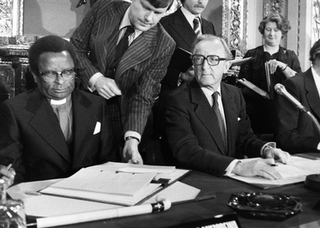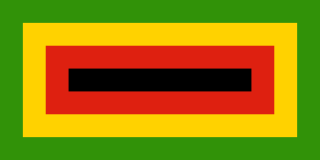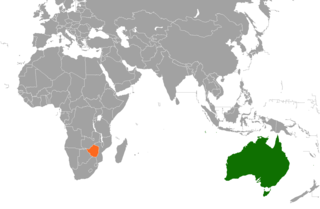
Politics of Liberia takes place in a framework of a presidential representative democratic republic modeled on the government of the United States, whereby the President is the head of state and head of government; unlike the United States, however, Liberia is a unitary state as opposed to a federation and has a pluriform multi-party system rather than the two-party system that characterizes US politics. Executive power is exercised by the government. Legislative power is vested in both the government and the two chambers of the legislature.

The politics of Zimbabwe takes place in a framework of a full presidential republic, whereby the President is the head of state and government as organized by the 2013 Constitution. Executive power is exercised by the government. Legislative power is vested in both the government and parliament. The status of Zimbabwean politics has been thrown into question by a 2017 coup.

Zimbabwe Rhodesia was an unrecognised state that existed from 1 June 1979 to 12 December 1979. Zimbabwe Rhodesia was preceded by an unrecognised republic named Rhodesia and was briefly followed by the re-established British colony of Southern Rhodesia, which according to British constitutional theory had remained the proper government after Unilateral Declaration of Independence (UDI) in 1965. About three months later, the re-established colony of Southern Rhodesia was granted internationally recognised independence as the Republic of Zimbabwe.

Venda was a Bantustan in northern South Africa, which is fairly close to the South African border with Zimbabwe to the north, while to the south and east, it shared a long border with another black homeland, Gazankulu. It is now part of the Limpopo province. Venda was founded as a homeland by the South African government for the Venda people, speakers of the Venda language. The United Nations and international community refused to recognise Venda as an independent state.

The Lancaster House Agreement, signed on 21 December 1979, declared a ceasefire, ending the Rhodesian Bush War; and directly led to the creation and recognition of the Republic of Zimbabwe. It required the imposition of direct British rule, nullifying Rhodesia’s 1965 Unilateral Declaration of Independence. British governance would be strictly proscribed to the duration of a proposed election period; after which independence would follow. Crucially, the political wings of the black nationalist groups ZANU and ZAPU, who had been waging the escalating, and increasingly violent insurgency, would be permitted to stand candidates in the forthcoming elections. This was however conditional to compliance with the ceasefire and the verified absence of voter intimidation.

Bishop Abel Tendekayi Muzorewa served as Prime Minister of Zimbabwe Rhodesia from the Internal Settlement to the Lancaster House Agreement in 1979. A United Methodist Church bishop and nationalist leader, he held office for only a few months.

The Prime Minister of Rhodesia was the head of government in Rhodesia. Rhodesia, which became a self-governing colony of Britain in 1923, unilaterally declared independence on 11 November 1965, and was thereafter an unrecognized state in practice until 1979. In December 1979, the country came under temporary British control, and in April 1980 the country gained recognized independence as Zimbabwe.
Chief Jeremiah Sikireta Chirau, ICD was a notable figure among (Southern) Rhodesia's chiefs, and during the UDI he became the only leader of the Zimbabwe United People's Organisation (ZUPO), a party largely comprising chiefs.

Zimbabwe African National Union – Ndonga is a minor political party in Zimbabwe. Its members were originally part of Zimbabwe African National Union, but split with what would become ZANU–PF over tribal tensions. A portion of the party reunified with ZANU-PF in 2015.

The Internal Settlement was an agreement which was signed on 3 March 1978 between Prime Minister of Rhodesia Ian Smith and the moderate African nationalist leaders comprising Bishop Abel Muzorewa, Ndabaningi Sithole and Senator Chief Jeremiah Chirau. After almost 15 years of the Rhodesian Bush War, and under pressure from the sanctions placed on Rhodesia by the international community, and political pressure from South Africa, the United Kingdom, and the United States, the Rhodesian government met with some of the internally based moderate African nationalist leaders in order to reach an agreement on the political future for the country.
James Robert Dambaza Chikerema served as the President of the Front for the Liberation of Zimbabwe. He changed his views on militant struggle in the late 1970s and supported the 'internal settlement', serving in the attempted power-sharing governments.

The Zimbabwe Rhodesia general election of April 1979 was held under the Internal Settlement negotiated by the Rhodesian Front government of Ian Smith intended to provide a peaceful transition to majority rule on terms not harmful to Rhodesians of white descent. The internal settlement was not approved internationally but the incoming government under Bishop Abel Muzorewa did decide to participate in the Lancaster House talks which led to the end of the dispute and the creation of Zimbabwe.

General elections were held in Southern Rhodesia in February 1980 to elect a government which would govern the country after it was granted internationally recognised independence as Zimbabwe, in accordance with the conclusions of the Lancaster House Agreement. The result was a victory for ZANU, which won 57 of the 100 seats. Its leader, Robert Mugabe became the first Prime Minister of Zimbabwe when the country officially became independent from the United Kingdom in April.
The Independence Commemorative Decoration was a Rhodesian civil decoration awarded to persons who had rendered valuable service to Rhodesia. The award was instituted in 1970 by Presidential Warrant, the first awards being made the same year. Recipients were entitled to the post-nominal letters ICD.
The following lists events that happened during 1978 in Rhodesia.

Australia–Zimbabwe relations are foreign relations between Australia and Zimbabwe. Both countries have full embassy level diplomatic relations. Australia currently maintains an embassy in Harare, and Zimbabwe maintains an embassy in Canberra.
Khayisa Ndiweni (1913–2010) was chief in Zimbabwe. He was hugely respected in Matabeleland and a revered figure among his people in Ntabazinduna.

Rowan Cronjé was a Rhodesian politician who served in the cabinet under prime ministers Ian Smith and Abel Muzorewa, and was later a Zimbabwean MP. He emigrated to South Africa in 1985 and served in the government of Bophuthatswana.
George Rollo Hayman was a Rhodesian farmer and politician. A member of the House of Assembly, he served in several portfolios as a member of the Cabinet of Rhodesia under Prime Minister Ian Smith. Born in the United Kingdom, he moved to Southern Rhodesia at age four and served as a Royal Air Force pilot in World War II.














